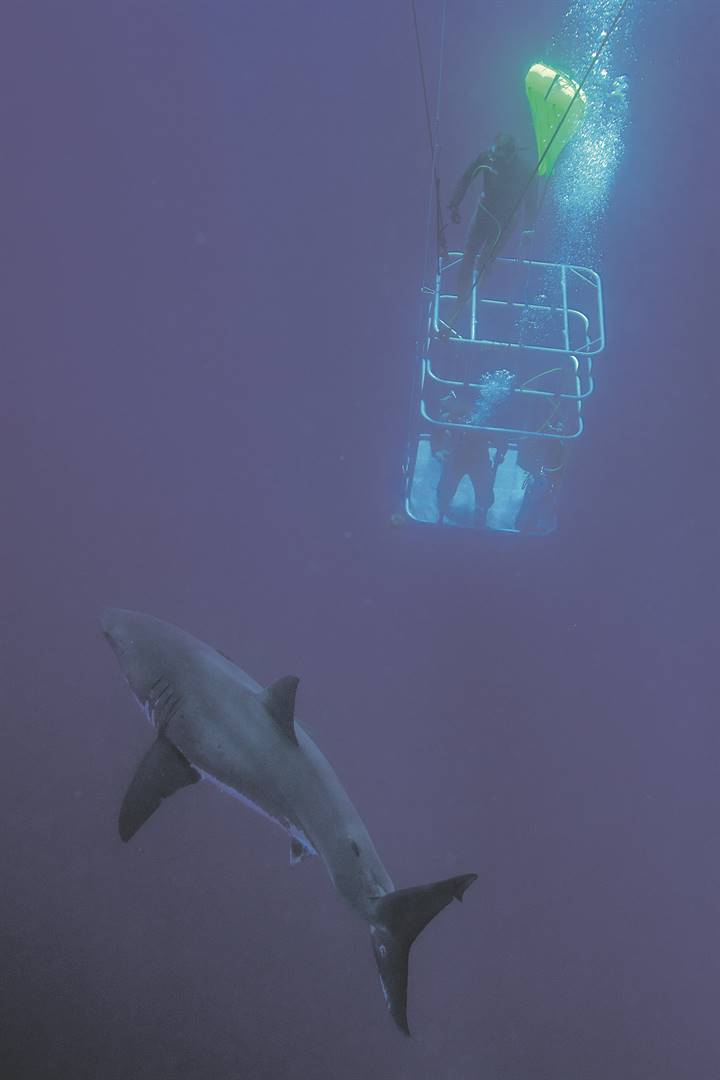
Despite resistance from watersport and human rights organisations, shark cage diving is continuing to gain momentum at South Africa’s main port cities as a tourism drawcard, creating jobs and providing edutainment.
Ocean tour operators in Cape Town, Durban and Port Elizabeth say that, although there was scepticism in the beginning due to a lack of knowledge, people are slowly accepting that shark cage diving provides a better understanding of the commonly misunderstood apex predator, and also brings in foreign currency as international tourists travel to view sharks up close.
In Cape Town, the ocean tour operator is Apex Marketing; it is Shark Cage Diving KZN in Durban; and Raggy Charters in Port Elizabeth.
In Port Elizabeth, the tours will start only in April because of delays by the department of environmental affairs in granting a licence, coupled with strong resistance from watersport bodies that are opposed to the activity.
Lloyd Edwards of Raggy Charters said: “We have been granted the permit by the department and we are just waiting for the actual hard copy. The shark cage diving tours will start from April.”
Raggy Charters charges R6 000 a person, though foreign visitors will pay $500 (R7 350). Their tours start at 7am and end at 3pm, and a maximum of 10 people are allowedin the cage.
A survey of the population of southern right whales off the coast of Cape Town has shown the second-lowest incidence of the aquatic mammals in 24 years and scientists in South Africa are linking the scarcity to the climate crisis.
The release of the findings of the survey, which was undertaken by the whale unit of the University of Pretoria’s Mammal Research Institute, comes as the city’s tourism industry is already puzzled by the sudden departure of great white sharks from False Bay, which lies off the east of the city. None of the sharks has been seen this year.
Shark dives, in which tourists are lowered into the sea in a cage, and whale watching are popular tourist activities in the region around Cape Town.
The whale survey, which was conducted by helicopter, found 200 of the whales in a stretch of False Bay, down from more than 1 000 last year, the university said.
In 2016 only 119 were seen.
The changes might be related to climate conditions in the southern ocean, which lies off the Antarctic.
“We believe the whales are not finding enough food, because of changes in the climate conditions of the southern ocean, possibly related to the climate crisis,” the unit said.
“Southern right whales eat krill [small crustaceans] and copepods [also small crustaceans] and with not enough food they cannot store enough energy to complete the migration and reproduction.
“This has implications for population recovery.”
Southern right whales can grow to 16m and weigh 60 tons. – Bloomberg
Sources told City Press that there were two other applications to operate that were awaiting approval.
“The aim of our tours,” said Edwards, “is to showcase the diversity of Algoa Bay by giving our guests on board the opportunity to encounter and learn about a wide variety of marine species, from the endangered African penguin and iconic bottlenose dolphin to the magnificent, though misunderstood, great white shark.”
However, there is a disclaimer in case guests complain that they did not see any of these marine animals during the tour.
“Raggy Charters cannot guarantee animal sightings. We provide guests with the opportunity to view wild animals that move around at their own will, and we cannot be held responsible for the movements of these animals,” said Edwards.
The tour operator has various educational and conservation projects to help people learn more about the sharks and marine species, including beach cleaning. This project started in 2014 and is executed by organising communities.
Another project is Baywatch, which was established in 1992. Volunteers from around the world come to South Africa to teach young people about the marine environment. They also support the penguin research fund.
When you cage dive to view sharks, a cage is attached to the side of a boat at shoulder height. Your shoulders will be above the water while you wait for a shark to come along. When it does, you hold your breath and stick your head underwater to view it.
In Durban, John Miller has been running the tours for 25 years and has not encountered any incidents.
“This is a tourism drawcard and also serves as an education platform. We use chum to attract the sharks and this is the gripe people have. They say we are attracting sharks closer to the beaches, but that’s not it. All over the world operators use chum. We operate about 5km into the sea from the beaches. Sharks eat fish, not humans – that’s not their diet,” said Miller, who charges R1 000 a person.
Miller said: “We educate people by way of documentaries, conferences and talks, so they are informed and hopefully lose their fear of these incredible animals. We also assist in research projects conducted by Marine Coastal Management.”
Karen Cooper of Apex Marketing in Cape Town said they operated around False Bay.
“Our permit allows us to operate only at Seal Island. We do chum, however, the amount of chum is restricted. There used to be resistance but, if anything, we attract sharks to the island away from the beaches,” she said.
Although conceding that their operations were a tourism draw card, the three operators were reluctant to reveal what they made in turnover. But judging from the cost per person, it is lucrative.
Among those resisting shark cage diving in Port Elizabeth are the organisers of the Ironman Triathlon.
Ironman SA director of operations Paul Wolff said: “We are against anything that could endanger our athletes and put the race at risk.”
Renowned marine biologist and tourism expert Peter Myles voiced concerns: “Is there a risk that chum not consumed by great white sharks could drift towards swimming beaches depending upon the flow of the currents and prevailing winds?
Is there a risk that great whites in transit or that are migrating could hang around in Algoa Bay a bit longer because of chum, thereby increasing the possibility of human and great white interaction? Could chumming change the behaviour of great whites as they begin to associate boats with humans and food? More scientific research must be done.”
What are your feelings about shark-diving? Is it an income earner or an intrusion?
SMS us on 35697 using the keyword SHARK and tell us what you think. Include your name and province. SMSes cost R1.50. By participating, you agree to receive occasional marketing material




 Publications
Publications
 Partners
Partners









